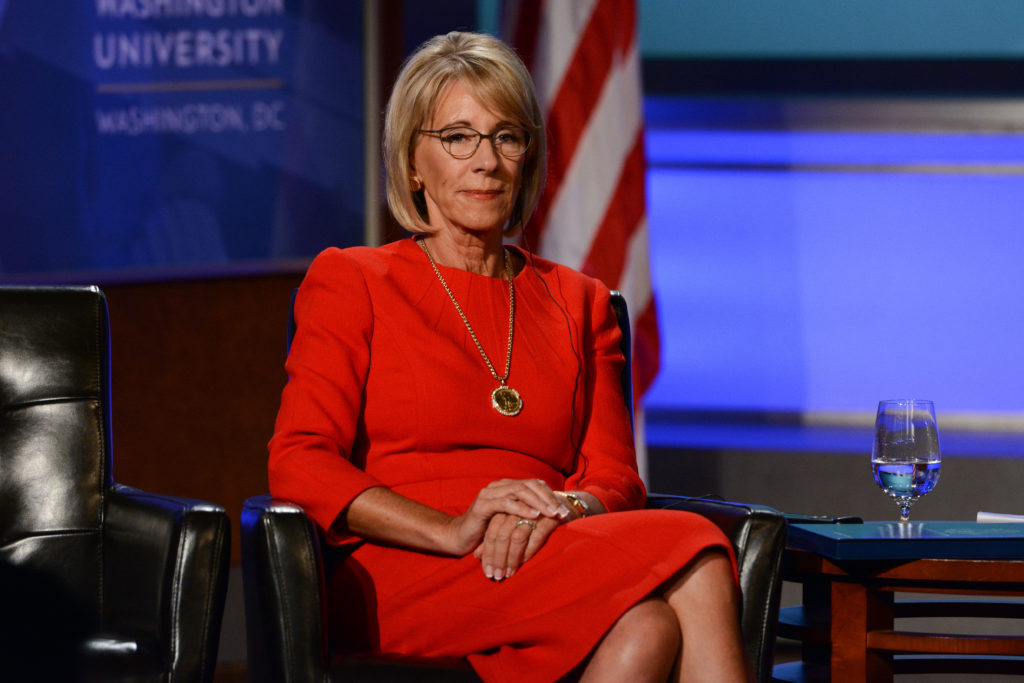Experts said a new set of Department of Education regulations governing Title IX investigations will undermine survivors’ rights during investigative processes.
The regulations – which carry the force of law – break from Obama administration guidelines that focused on survivors’ rights and assumed assailants’ guilt in Title IX case proceedings. Four Title IX experts and sexual assault survivor advocates said the new regulations could deter students from reporting sexual assault and harassment and require students to relive their trauma during case proceedings.
The new regulations define sexual harassment as “unwelcome” sexual conduct that is “severe, pervasive and objectively offensive,” according to the education department’s summary of the regulations. Some changes include measures to eliminate the single-investigator model in favor of a multiple person hearing board, allow cross-examination during live hearings and no longer require faculty, staff and advisers to be mandatory reporters.
The regulations include measures that allow universities to forgo the preponderance of evidence, or “more likely than not,” standard for determining guilt in favor of the “clear and convincing” standard, which requires more evidence to prove guilt. The regulations state that universities are not required to investigate sexual misconduct cases that occur off-campus, in non-University owned buildings or on non-GW study abroad programs.
“Essentially for what they’re saying the new definition is for, it could be so severe, pervasive and objectively offensive that it effectively denies a person equal access to the school’s education program or activity,” said Kenyora Parham, the executive director of End Rape on Campus.
Tamara Washington, the assistant director of the Office of Advocacy and Support, said the office’s “commitment” to survivors will not change in light of the new regulations, and officials will continue to provide resources like information about reporting options and counseling.
Washington said members of the GW community can fill out a feedback form to share their thoughts, concerns and questions about the new regulations, which officials will use to “inform” how the advocacy and support office will respond to Title IX policy changes.
“We remain committed to building a culture of care that empathetically supports, empowers and respects the autonomy of survivors,” Washington said in an email.
Caroline Laguerre-Brown, the vice provost for diversity, equity and community engagement, said officials are reviewing the new regulations and will continue encouraging individuals to report allegations of sexual misconduct. Laguerre-Brown said officials will continue to provide support and services to individuals who do not file formal complaints.
“We understand that concerns have been raised that some of the new requirements may discourage individuals from coming forward with allegations of sexual misconduct,” she said in an email. “The University remains committed to supporting and promoting the well-being of our community.”
Title IX coordinator Rory Muhammad said the new regulations will require changes to the office, but GW’s “key features” will remain the same.
“Today we do comprehensive and fair investigations, and under the new regulations we will continue to do comprehensive and fair investigations,” Muhammad said in an email.
Officials declined to specify what changes they will make to the Title IX office and when changes will go into effect. Universities are required to comply with the new regulations by Aug. 14.
Students Against Sexual Assault released a statement on Facebook Wednesday condemning the changes and proposing measures officials can take to mitigate the regulations’ “dangerous consequences.”
SASA’s proposals include measures like retaining the preponderance of evidence standard and maintaining “responsible employees” – faculty, staff and advisers who are required to report cases of sexual misconduct. The post called on officials to use outside judges with expertise in Title IX to hear evidence and determine responsibility instead of volunteers who lack training and may know the parties involved.
“SASA strongly condemns the [ED]’s changes as another shameless attack on survivors and other marginalized communities on college campuses,” the post states.
Title IX experts said the new regulations will likely decrease reporting of sexual misconduct and “disempower” survivors.
Parham, the executive director of End Rape on Campus, said new regulations define sexual harassment as severe or repeated trauma, which could present a barrier to reporting harassment.
The new regulations also require that universities carry out live hearings in sexual assault and sexual harassment cases instead of private investigations and both the complainant and the respondent be allowed to have an adviser throughout the length of the hearing, according to the education department’s summary.
Parham said the live hearings will be unfair to survivors because they will have to be questioned by someone who is biased against them in favor of the accused.
“The live cross-examination piece would also be detrimental, particularly because having advisers of choice would then essentially mean that survivors are then even questioned of their truthfulness,” Parham said.
She said students can call their congressional representatives urging them to reinstitute the Campus Accountability and Safety Act, which would provide students with a confidential Title IX adviser and require comprehensive sexual assault and harassment reporting from universities.
“Essentially what that legislation would provide are a little bit more safeguard provisions in place,” she said.
Shana Maier, a professor of criminal justice at Widener University in Pennsylvania, said the live hearings will force survivors to endure re-traumatization and re-victimization.
“My concern is that it’s going to lead to even less reporting, if they know that they have to sit in a room or wherever they may be with other people and with their alleged perpetrator and detail exactly what happened,” Maier said. “It’s almost like putting, for lack of a better use of words or way to put it, I feel like it’s almost putting the survivor on trial.”
She said students who report sexual harassment typically report after having repeated harassment experiences, and the new Title IX regulation makes reporting even more difficult for those individuals.
“I think it’s problematic,” Maier said. “Any legal changes that further disempower survivors, any legal changes that disempower survivors or minimize their experiences are certainly problematic.”
Nellie Drew, the director of State University at Buffalo’s Center for the Advancement of Sport, who researches Title IX, said requiring students to report directly to the Title IX director and attend a live hearing could lead to a decrease in reporting. She said the regulations are “tone deaf” to survivors’ circumstances and deter students from reporting incidents to administrators.
“They completely ignore all that we’ve learned about victim awareness and how to treat a victim,” she said. “And that’s a major, major issue.”
Lizzie Mintz and Clara Duhon contributed reporting.








